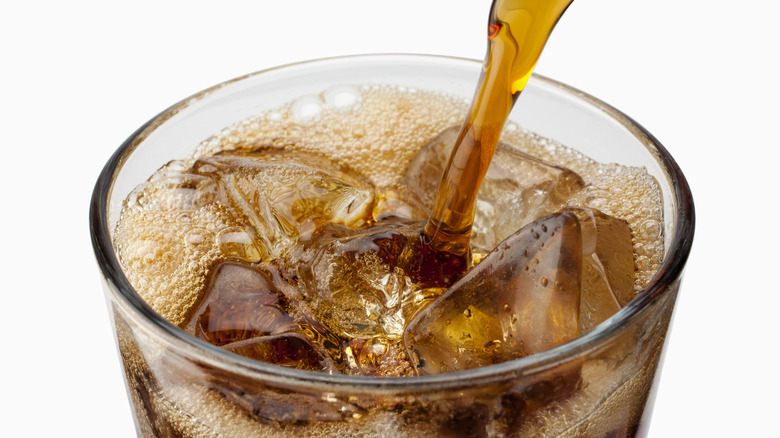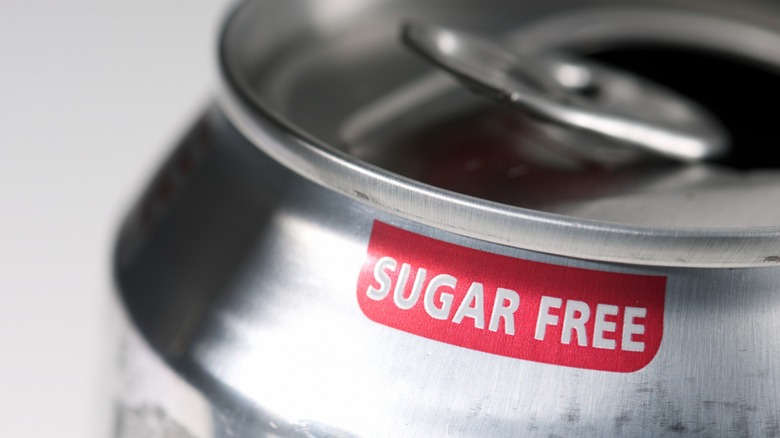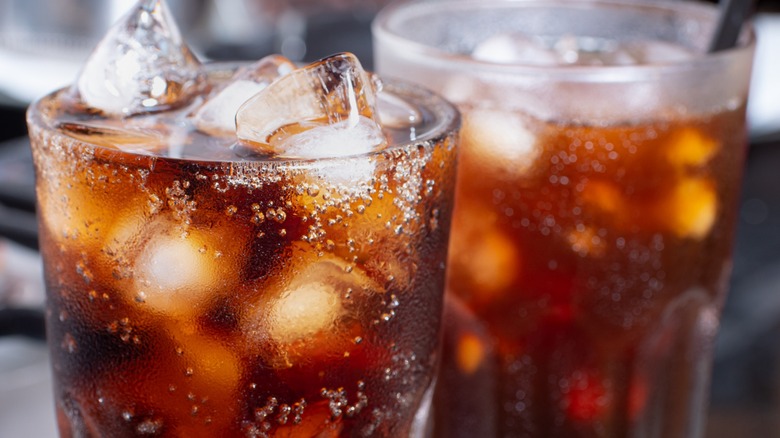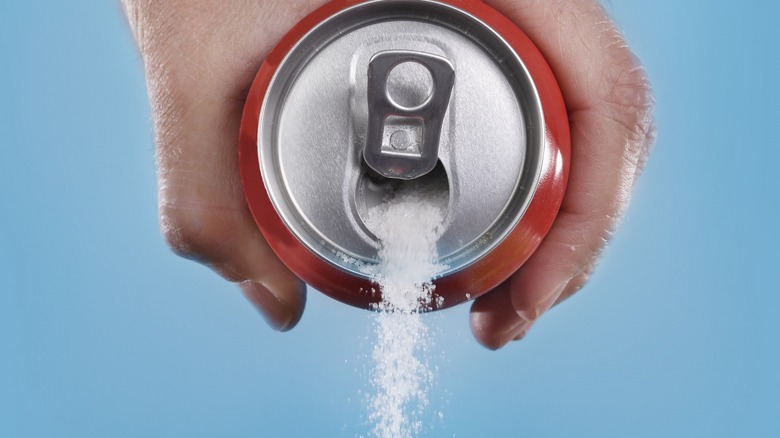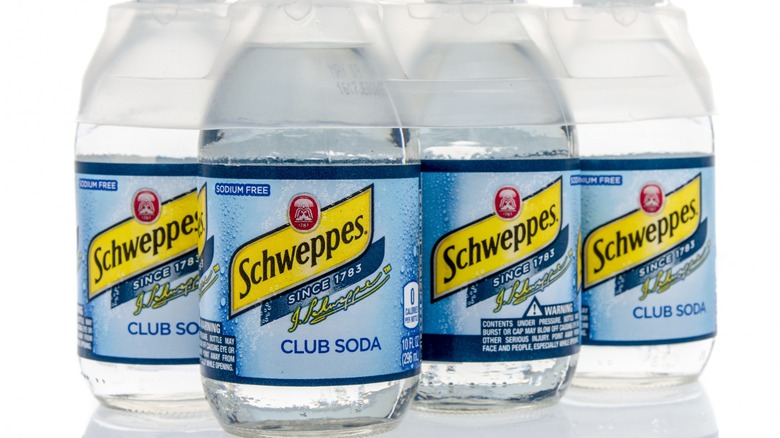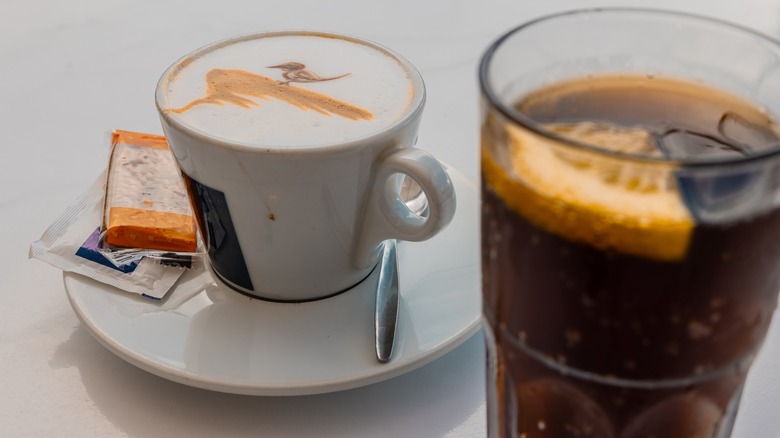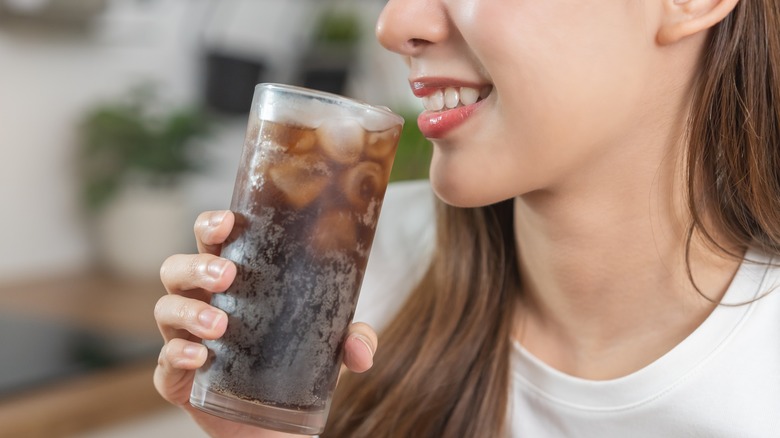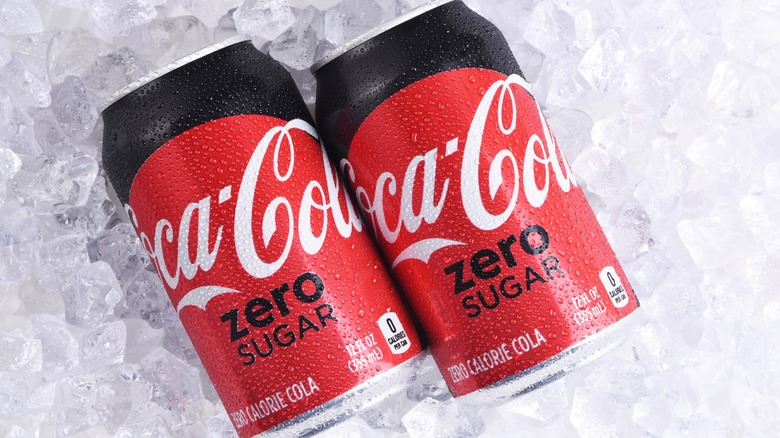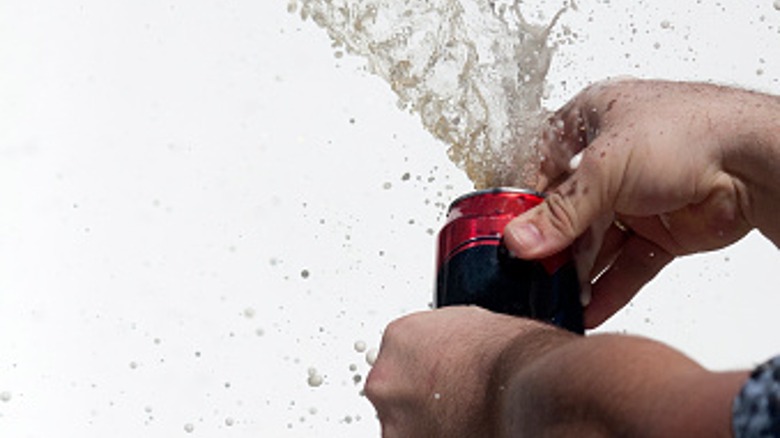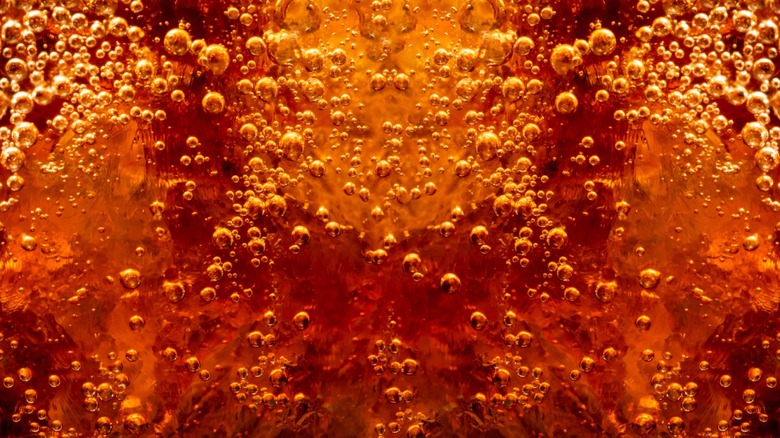10 Myths About Soda That Deserve To Get Busted
From a refreshing drink available at every fast food restaurant to a must-have product for birthday parties and holiday gatherings, soda has long been a staple of the American diet. Because of that, myths and misconceptions run rampant about this drink.
The truth about soda is good, bad, and somewhere in the middle. It may not be the worst thing you can drink, and it's certainly not the best — but, in moderation, soda can be enjoyable. Still, not every soda is equal. While most people around the world drink Coke or Pepsi, there are many other brands and variations. At one end of the spectrum, plain carbonated water is often called soda. On the other end, there's dirty soda, which is handcrafted and can contain a number of ingredients. And, who doesn't love an occasional indulgence like Italian soda at a good restaurant?
Soda is both beloved and vilified, but before passing judgment, let's clear up the myths before you open up that next can.
Myth: Soda is not addictive
This soda myth is more of a technicality. Soda addiction is not officially categorized as a disorder, like alcohol or food addiction, but it can become a habit that is difficult to kick.
One reason is that a single soda may contain multiple ingredients that people can become addicted to, such as caffeine, sodium, and sweeteners. You may have developed a soda habit if you suffer from symptoms like strong cravings, thirsting only for soda, thinking about soda too much, and an inability to stop or curb drinking soda. People who frequently drink soda and suddenly stop can experience withdrawal, too, including symptoms like headaches, irritability, feeling groggy, and even depression.
How do you know if you are at risk of getting addicted to soda? The pleasurable feeling you get from drinking soda comes from the hormone dopamine. The more frequently you drink soda, the less enjoyable those hits become. Eventually, you will need more soda to get that feeling back. When that happens, you may be hooked (information from Healthline).
To avoid this, limit your intake of soda to a few times a week or special occasions. And, don't turn to soda to reward yourself or to soothe unpleasant feelings or you may find yourself depending on that bubbly drink to cope. Instead, replace your cravings with a glass of iced tea or water.
Myth: Diet soda is a healthy alternative
People believe that diet sodas are healthier because they don't contain sugar or high fructose corn syrup. Unfortunately, there are other health risks that make it bad for you. Research from the American Heart Association (AHA) shows that low-calorie sweetened drinks increase the risk of heart conditions, high blood pressure, metabolic issues including diabetes, brain conditions like stroke, and liver problems. Some scientists are not sure why diet sodas increase the risk of health problems. They believe that one explanation is that many people switch to diet soda because of existing health issues, such as diabetes; in other words, they are already at risk of these problems.
But, the more likely explanation is that artificial sugars may cause health problems. Sweeteners like saccharin, aspartame, and sucralose are linked to many of the same conditions found in the AHA's studies, especially metabolic and cardiovascular conditions (per the Cleveland Clinic). People with certain health conditions may be even more reactive. Not only that, but the World Health Organization just categorized aspartame as a possible cancer-causing agent.
Bottom line: Limit your intake of diet soda. It's better to replace soda with a drink that does not contain as much sweetener, even if it's not sugar.
Myth: Soda is merely sugar, coloring, and carbonated water
First off, this myth is false because different sodas contain different ingredients.
Secondly, that caramel color ingredient is not as innocent as it sounds. In 2014, Consumer Reports tested 110 cans of soda and discovered a cancer-causing ingredient, 4-methylimidazole (4-MEI). This ingredient is formed when caramel color is processed. Different formulas are used but this color is essentially made by heating some type of processed powder or liquid sugar. Though, soda companies have since minimized the levels of 4-MEI in their drinks.
Another additive found in many Coke and Pepsi products is phosphoric acid. This is a preservative used to prevent mold and bacteria in foods, especially those that contain sugar. It is a naturally occurring chemical in your body but the heavily processed kind in food is anything but natural. Phosphoric acid is mostly harmless but too much of it can reduce calcium in your body, leading to osteoporosis and heart disease (per Healthline). If you're worried about the health of your bones, we advise you drink to moderate amounts of soda.
Myth: The biggest health risk of soda is diabetes
Yes, too much soda with sugar can contribute to Type II diabetes. But, there are many other health issues linked to soda consumption. We've already discussed links to osteoporosis, heart disease, diabetes, and vascular health but unfortunately, there's more.
For example, drinking huge amounts of soda increases your risk of developing rheumatoid arthritis. Even just one soda daily can increase that risk by up to 63%! This statistic is linked to sweeteners, both processed and artificial, which can cause the inflammation that's at the root of this disease.
Studies also show that women who drink diet sodas every day are up to 30% more likely to have impaired kidney function compared to women who don't drink soda at all (from Health Grade). These stats held even when researchers accounted for other issues, such as smoking or weight challenges. Americans in general are already at a high risk of kidney disease, and we have to wonder if soda is contributing to those numbers.
Finally, another problem in soda is high fructose corn syrup (HFCS). This sugar has fallen out of favor in recent years because it contains more fructose than other types. That ingredient can lead to an increased risk of gout, fatty liver disease, diabetes, obesity, and inflammatory diseases. HFCS may even harm your cells (per Healthline). Despite its unpopularity, it's still one of the main ingredients in Coke and Pepsi.
Myth: Plain club soda without sugar is the best alternative
Carbonated drinks have many names, and each is slightly different. Seltzer is plain carbonated water that can be enhanced with flavoring, and club soda is similar but has added minerals. Tonic water, mostly used in cocktails, also has minerals including quinine and sugar or high fructose corn syrup, and therefore does not qualify as "plain."
The good news? Seltzer and club soda are, of course, better than soda that's loaded with sugar and chemicals. They can hydrate you, help you break a soda habit, and also provide a full feeling from the carbonation.
However, while it is certainly better than soda filled with additives and sweeteners, these carbonated drinks have also been associated with risks since there are no ingredients to tone down the bubbly effects. Intense carbonation can lead to bloating, burping, gas, and stomach cramps, according to information from Medicine Net. If plain soda upsets your stomach or you have been diagnosed with reflux, limit your intake of these carbonated drinks.
Myth: Soda is no worse than coffee
Usually, when we're comparing coffee and soda, we're talking about caffeine. While coffee and sodas may vary, coffee has far more caffeine. Eight ounces of most varieties of brewed coffee normally has 96 milligrams of caffeine, while the same-size cola has only 22. If you need to watch your caffeine intake further, citrus soda and root beer are good choices since they contain no caffeine.
Coca-Cola and Pepsi both make caffeine-free versions of their classic sodas. But, both of these drinks contain high fructose corn syrup, around 40 grams of sugar, caramel color, and phosphoric acid. Even one drink per day with high levels of sugar can cause serious health conditions, including an elevated risk of liver cancer (according to JAMA Network). While coffee comes with its own set of myths and consumption guidelines, if you want a caffeine boost, a small cup of black coffee is a simpler choice than soda.
Myth: Soda can dehydrate you
When it comes to dehydration, it's not so much soda as it is what's in it that poses problems. The first ingredient that can cause trouble is caffeine, which is a diuretic. Have you ever had a lot of soda and felt the need to use the bathroom more than usual? Diuretics increase how much urine your body produces. Some people believe that when this happens, the soda has dehydrated you.
However, research shows that an increased frequency of urination does not dehydrate the body (from Healthline). Not only that, but you'd need a significant amount of caffeine to really increase your urination levels.
Sugar is more likely to cause dehydration than caffeine because it can stop your body from absorbing water properly. To avoid this problem, carefully balance your intake of sweets throughout the day.
Drinking more soda usually means drinking less water, and that can lead to dehydration. While soda may not be the root of your problem, it can cause you to feel mild dehydration symptoms, such as dry mouth or headaches. Be sure to balance your soda and water intake, especially when you're extra active.
Myth: Zero-calorie sodas are great if you're on a diet
Research is beginning to surface and it's not good news for soda drinkers. Diet and zero-calorie sodas may actually increase food cravings and weight gain. Most of the experiments done on this topic are animal studies, but the results are not what you'd expect. One study compared rats who drank diet beverages to rats who drank water or flat soda. The soda-drinking rats ate more, gained weight faster, and had increased levels of ghrelin (the hormone in your brain that tells you when you're hungry) in their stomachs (information from Harvard Health Publishing).
A similar study was done with humans and, again, ghrelin levels rose for the diet soda drinkers. This study did not control for other factors, such as comparing the impact of other beverages, so there is still more work to be done to reach a firm conclusion. Still, the best option for people who want to lose weight and curb their cravings is to replace soda with water altogether.
Myth: Mixing soda and certain candies can kill you
Mentos and Pop Rocks were both accused of killing people when mixed with soda. In 1974, Pop Rocks was introduced to the world by General Foods. These sugary candies "exploded" in your mouth by releasing small amounts of carbonation.
For years, rumors circulated that these candies could kill you. By the 1990s, these rumors had turned into a full-blown urban legend — people started claiming that Mikey, the kid from the 1970s Life cereal commercials, had died after eating Pop Rocks with a six-pack of soda. Mikey, played by actor John Gilchrist, is still alive and well as of this writing. There's no evidence that anyone died from Pop Rocks. While the company took a brief manufacturing break in 1980, you can still get the candy today.
The same type of claims circulated about Mentos. This time, the stories claimed that two children died from combining Mentos and Coke. When you add Mentos to soda, there is a reaction: The soda explodes in a geyser-like fashion from the bottle. The more carbonated the soda, the bigger the reaction. While there's no conclusive evidence that anyone died from this, some YouTube hopefuls have thrown up after ingesting large amounts of soda with Mentos. We advise you to avoid trying this gimmick!
Myth: Soda used to contain flame retardant
For years, Mountain Dew was accused of using flame retardant in its soda. Millions have viewed and shared articles about this rumor, but is it true?
The ingredient in question is brominated vegetable oil (BVO). This is an FDA-approved additive that's only allowed with limited uses in very small amounts for food products. In soda, BVO keeps the ingredients blended together so they remain uniform throughout the drink.
It's true that BVO has a patent for use as a flame retardant, but that doesn't mean it's frequently used in that way. Brominated flame retardants have a variety of ingredients. The Bromine Science and Environmental Forum, which represents companies that make these products, claims that their companies do not market BVO this way and that there is no connection to flame retardants.
Regardless of these issues, PepsiCo removed BVO from all their soft drinks years ago, so don't worry if you're a fan of the Dew! Meanwhile, the FDA is considering removing approval for BVO as a food ingredient altogether.

